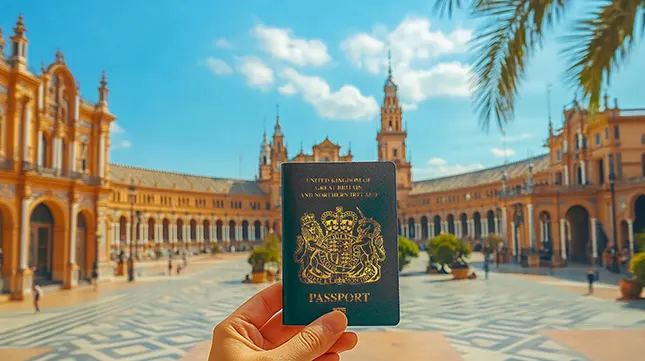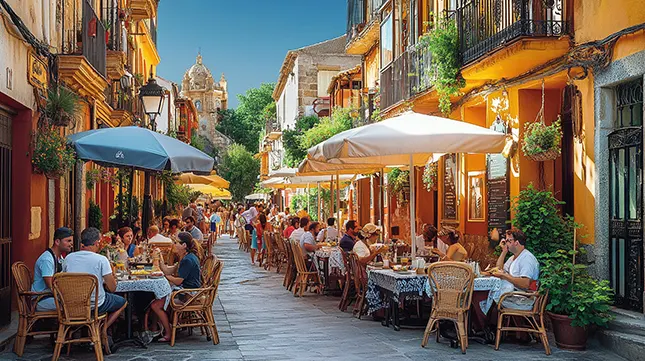For many Britons, moving to Spain is the ultimate dream, a life of sunshine, siestas, and a more affordable cost of living.
Whether you’re drawn to the golden beaches of the Costa Blanca, the cosmopolitan energy of Barcelona, or the tranquil countryside of Andalusia, Spain has something for everyone.
But while the idea of swapping the UK’s grey skies for Spain’s Mediterranean climate is appealing, making the move requires careful planning.
Brexit has added extra steps to the relocation process, but moving to Spain is still very possible with the right preparation.
The country continues to welcome British expats, offering excellent healthcare, a lower cost of living, and a vibrant social culture prioritising family, food, and community.
In fact, Spain remains one of the most popular destinations for UK retirees, remote workers, and families seeking a better work-life balance.
This guide will cover everything you need to know about relocating to Spain in 2025, from visa requirements and healthcare access to finding the perfect place to live.
With the right knowledge, your dream of a new life in Spain can become a reality.
Visas and Residency: Navigating Post-Brexit Rules for UK Expats
To ger your exciting adventure underway, first you bust secure the right visa.
Since Brexit, UK nationals no longer have automatic freedom of movement within the EU.
If you’re planning to relocate to Spain, securing the right visa or residency permit is essential, though the process may seem complex, with the right guidance, it’s entirely manageable.
For retirees, the Non-Lucrative Visa is a popular choice.
This visa allows you to live in Spain without working, provided you can demonstrate sufficient financial resources to support yourself.
If employment is your goal, you’ll need a Work Visa, typically arranged by a sponsoring Spanish employer.
Alternatively, if you plan to work for yourself, the Self-Employed Visa (Autónomo) is the route to take.
If you can invest, the Golden Visa offers residency to those investing at least €500,000 (£420,000) in Spanish property.
This option is particularly attractive for those seeking long-term residency without employment restrictions.
Once you obtain a visa, you’ll need to apply for a TIE (Tarjeta de Identidad de Extranjero), Spain’s foreigner identity card, which serves as proof of your residency status.
Residency permits are not indefinite and must be renewed periodically.
For the latest official visa requirements and application details, visit the Spanish Consulate website.
How to Hire a Gestor in Spain

Navigating Spanish bureaucracy can be time-consuming and complicated. If you are struggling with your visa applications, many expats hire a gestor (an administrative consultant) to assist with paperwork and ensure a smooth process.
A gestor is a professional administrative consultant in Spain who helps individuals and businesses navigate the country’s bureaucratic processes.
A gestor not only offers help with visas, but they can also assist with issues such as taxes, vehicle registration, and other official paperwork. Here’s how to find and hire a reliable gestor:
1. Search for a Reputable Gestor
- Ask for recommendations from other expats through personal connections or expat forums such as Expat.com or British Expats Forum.
- Search online directories such as Paginas Amarillas (Spain’s Yellow Pages).
2. Choose a Gestor Specialising in Your Needs
Some gestors specialise in residency applications, tax filing, self-employment registration (Autónomo), or property transactions. Ensure you choose one with experience relevant to your situation.
3. Verify Credentials and Reputation
- Look for membership in professional organizations such as Colegio de Gestores Administrativos de España (www.consejogestores.org).
- Read client reviews and testimonials to check their reputation.
4. Confirm Services and Fees
Gestores charge varying fees depending on the complexity of the service. Get a clear price estimate before hiring. Some charge a flat fee, while others bill hourly.
Once you find a suitable gestor, book an initial consultation (in person or online). Be prepared with documents related to your case, such as visa requirements, tax records, or property contracts.
5. Communication and Language
Hiring a translator who speaks English can be helpful if you don’t speak Spanish. Some specialize in assisting expats and offer services in multiple languages.
Hiring a gestor can simplify Spain’s complex paperwork processes and avoid potential delays or costly mistakes.
Choosing the Perfect Place to Call Home

Selecting the right location in Spain can make all the difference in your long-term happiness.
Whether you’re looking for a lively city, a tranquil coastal retreat, or a family-friendly community, Spain offers a diverse range of places to suit different lifestyles and budgets.
From young professionals seeking career opportunities to retirees dreaming of a laid-back Mediterranean life, here are some of the top destinations for UK expats.
Costa Blanca
A favourite among British expats, Costa Blanca boasts stunning beaches, a warm climate, and a mix of bustling towns and peaceful villages.
Popular areas like Jávea, Denia, and Altea offer a balance between traditional Spanish charm and modern amenities.
The region is well-known for its golf courses, friendly expat communities, and lower cost of living compared to other coastal hotspots.
Valencia
Spain’s third-largest city, Valencia, is an excellent choice for those who want to blend city life and beachside relaxation.
With its rich cultural heritage, stunning architecture, and growing job market, Valencia is an attractive option for professionals and families.
The city also offers a lower living cost than Madrid and Barcelona, making it an affordable urban alternative.
Gran Canaria
For those seeking an island lifestyle, Gran Canaria in the Canary Islands provides year-round sunshine, breathtaking coastal views, and a relaxed pace of life.
The capital, Las Palmas, has a thriving expat community and excellent infrastructure, while quieter towns like Maspalomas and Puerto Rico offer a more tranquil escape.
Málaga
Located in Andalusia, Málaga is an exciting coastal city offering a mix of traditional Spanish culture and modern conveniences.
With a major international airport, top universities, and a growing tech industry, Málaga is a fantastic option for younger expats, remote workers, and students.
Its picturesque old town, lively restaurant scene, and proximity to beautiful beaches make it a well-rounded choice.
Seville
For a truly authentic Spanish experience, Seville is a city full of history, culture, and charm.
Its stunning Moorish architecture, flamenco scene, and vibrant festivals make it a great destination for those wanting to immerse themselves in Spanish traditions.
The cost of living is lower than in Madrid or Barcelona, and its warm climate makes it appealing to retirees and families.
Tenerife
Another fantastic island option, Tenerife, is a paradise for those seeking sunshine and natural beauty.
The island offers affordable property prices, a relaxed lifestyle, and excellent healthcare services.
Towns like Los Cristianos and Costa Adeje are particularly popular with British expats, offering stunning beaches and a welcoming international community.
Madrid
Spain’s bustling capital, Madrid, is perfect for those seeking career opportunities, world-class dining, and vibrant nightlife.
While the cost of living is higher than in other cities, Madrid’s strong job market, excellent transport links, and cultural attractions make it a fantastic choice for professionals and students.
The city’s parks and green spaces also provide a welcome balance to its fast-paced lifestyle.
Torremolinos
Located along the Costa del Sol, Torremolinos is a great option for retirees and families looking for a relaxed coastal lifestyle.
The town is known for its excellent healthcare services, beautiful beaches, and active expat community.
It also offers a lower cost of living than nearby glitzy Marbella while still providing access to great amenities and entertainment.
As there are so many great locations in Spain to choose from, you can quickly feel overwhelmed.
Before making your final decision, visiting your chosen location in person is highly recommended.
Spend time exploring neighbourhoods, speaking with locals, and experiencing daily life. This will help ensure your new home aligns with your expectations and lifestyle.
Moving to Spain is a life-changing decision. Choosing
the right place to settle will make all the difference in your experience!
Cost of Living in Spain vs. the UK – How Much Will You Save?

One of the biggest draws for UK expats moving to Spain is the lower cost of living.
On average, living expenses in Spain are significantly cheaper than in the UK, making it an attractive destination for retirees, remote workers, and families looking for a better quality of life at a more affordable price.
According to Numbeo, the overall cost of living in Spain is nearly 40% lower than in the UK.
While expenses vary by region, everyday essentials such as housing, groceries, utilities, and dining out are much more budget-friendly than in Britain.
Utility Bills
Electricity, water, and internet costs are substantially lower in Spain.
Many expats report paying half of what they would for utilities in the UK.
Air conditioning in the summer may increase electricity bills, but overall, the temperate climate means you’ll spend less on heating during winter.
Food & Dining Out
Eating out and grocery shopping are also noticeably cheaper in Spain.
A three-course meal at a mid-range restaurant typically costs around €50, whereas in the UK, a similar meal could cost £80 or more.
Fresh produce, local wines, meats, and seafood are more affordable, particularly when shopping at traditional mercados (markets).
One of the most well-known supermarkets, Mercadona, has over 1,600 stores across Spain—checking their website can give you a good idea of grocery costs.
Transport & Fuel
Public transport in Spain is efficient and far cheaper than in the UK.
A monthly transport pass in cities like Valencia or Seville costs around €40–€55, while in the UK, it can be well over £100.
While fuel prices in Spain also tend to be lower, making driving a more affordable option.
Salaries vs. Living Costs
Though Spain offers a cheaper lifestyle, salaries are generally lower than in the UK.
If you’re moving for work, factor in how your expected income will compare with living expenses.
However, people working from home and retirees often find that their savings or UK-based incomes stretch much further in Spain.
For a detailed cost comparison between Spain and the UK, visit Numbeo’s cost of living tool to get real-time insights into current prices.
Buying Property in Spain – What You Need to Know

The good news for UK expats dreaming of owning a home in Spain is that buying property is not restricted, even after Brexit.
However, unless you obtain residency, you’ll still be subject to the 90-day stay rule within a 180-day period, meaning you can only spend three months at a time in Spain without a visa.
How is Spain’s Property Market Performing in 2025?
Spain’s property market remains strong and competitive in 2025.
Housing prices are projected to rise between 5% and 5.9% due to a combination of high demand, limited supply, and continued foreign investment.
With interest rates falling, more buyers are entering the market, making now a strategic time to purchase before prices climb even higher.
Where to Find Properties?
If you’re looking to buy, Spain offers great opportunities. Properties in less touristy areas cost a fraction of what you’d pay in the UK.
When starting your search for a home in Spain, websites like Idealista are a great place to start.
They offer listings for both sales and rentals across the country.
It’s always recommended to visit prospective properties in person before making a purchase and to work with a trusted estate agent and legal advisor to avoid potential pitfalls.
Whether you’re planning to buy a holiday home, a retirement retreat, or a permanent residence, understanding market trends can help you make a wise investment in Spain’s dynamic property sector.
How to Buy a Home in Spain – A Simple Step-by-Step Guide

Buying a property in Spain as a British expat is a fairly straightforward process, but it’s essential to understand the legal and financial steps before diving in.
Whether you’re purchasing a holiday home, an investment property, or a permanent residence, following the right procedure will help you avoid unnecessary risks.
Step 1: Get an NIE Number
Before you can buy a property in Spain, you’ll need a Número de Identificación de Extranjero (NIE) a tax identification number for foreigners. You can apply for one at a Spanish police station or through the Spanish Consulate in the UK.
Step 2: Set a Budget & Arrange Financing
Decide how much you can afford, considering additional costs such as taxes, legal fees, and notary expenses (typically 8-12% of the property price). If you need a mortgage, Spanish banks usually offer 60-70% financing for non-residents. Compare options with reputable mortgage advisors.
Step 3: Find the Right Property
Search for properties on well-known platforms like Idealista, Kyero, and Rightmove. If possible, visit Spain to explore the area in person before committing to a purchase.
Step 4: Hire an Independent Lawyer
To avoid potential legal pitfalls, hire an experienced property lawyer who is independent of the seller or estate agent. A lawyer will check that the property has no debts, planning issues, or legal complications. You can find English-speaking lawyers through Advocate Abroad.
Step 5: Make an Offer & Pay a Deposit
Once you find the perfect property, negotiate the price with the seller. If your offer is accepted, you’ll sign a Contrato de Arras (reservation contract) and pay a 10% deposit to secure the deal.
Step 6: Finalise the Purchase at the Notary
The final step involves signing the Escritura de Compraventa (title deed) at a notary’s office. Once this is done, the property officially becomes yours, and the funds are transferred to the seller.
Step 7: Pay Taxes & Register the Property
After purchasing, you’ll need to pay property taxes and fees, which range from 8-12% of the purchase price. Finally, register your new home with the Spanish Land Registry to make your ownership official.
Final Tip: Work with Trusted Professionals
Navigating Spain’s property market can be complex, so hiring a local property lawyer and independent real estate agent will help ensure a smooth and secure transaction.
For a detailed guide on buying property in Spain, check out our Buying Property in Spain as a Foreigner from the UK blog.
The Rental Market is Also Heating Up

If you’re considering renting before buying, be aware that rental prices are at record highs, especially in major cities like Madrid, Barcelona, and Valencia.
Demand is outpacing supply, meaning competition for good rental properties can be tricky.
However, smaller towns and inland regions often have more affordable options with better availability.
As a guide, you can expect to pay £ 30 less for a rental home in Spain, with the average monthly cost working out at around £713 for a one-bedroom property outside the city limits.
Popular platforms such as Idealista, Kyero, and Rightmove advertise possible rentals, so you can see for yourself what you might pay in the area you are hoping to move to.
How to Find a Trustworthy Estate Agent in Spain

Choosing the right estate agent is key to a problem-free property-buying experience in Spain.
With so many options, it’s essential to find someone reliable, knowledgeable, and experienced in working with expats.
Start by looking for agents who are members of reputable organisations like API (Agentes de la Propiedad Inmobiliaria) or the AIPP (Association of International Property Professionals).
These associations ensure agents adhere to professional standards and ethical practices.
Before committing, research online reviews, ask for client references, and confirm their experience with expats.
A good agent will provide honest advice, guide you through the legal process, and help with paperwork. Local agents also have insider knowledge of specific areas that larger firms might lack.
Be cautious of agents who pressure you into quick decisions or cannot provide proper documentation.
Finding a reputable professional will make your property purchase in Spain much more manageable and stress-free.
Banking in Spain

Setting up a Spanish bank account is a smart move if you plan to live in Spain.
It will make it easier to pay bills, rent, and taxes without the hassle of international fees.
Fortunately, the process is not complicated, and many banks cater to expats.
Major banks include Santander, BBVA, CaixaBank, and Sabadell.
All offer online banking and mobile apps for easy account management.
To open an account, you’ll typically need a valid passport, proof of address, and an NIE number. Some banks may also ask for proof of income or employment.
If you’re not a resident, many banks offer non-resident accounts, sometimes with higher fees.
Platforms like Wise, Revolut, and PayPal for international money transfers provide cost-effective solutions.
Many expats keep both UK and Spanish accounts for flexibility. Before choosing a bank, compare expat-friendly options at Bankinter.
Finding a Job in Spain – Where the Opportunities Are

While many UK expats move to Spain to retire or study, plenty also seek employment.
The good news is that Spain’s job market is growing, making it an attractive workplace.
In 2024, Spain’s GDP grew by 3.2%, outpacing much of Europe, and specific industries are experiencing a skills shortage, which could help boost your visa application.
High-Demand Sectors in Spain
- Tech & IT—Spain’s ICT sector has expanded rapidly, now worth over €120 billion, and there is strong demand for AI specialists, cybersecurity experts, and cloud engineers.
- Healthcare – With an ageing population, there’s an ongoing need for doctors, nurses, and health professionals.
- Engineering – Civil, mechanical, and electrical engineers are in demand, especially in renewable energy and infrastructure.
- Education – Spain’s focus on bilingual education means English teachers are consistently needed.
- Tourism & Hospitality – As one of the world’s top tourist destinations, Spain offers plenty of hotel management, event planning, and customer service opportunities.
For job listings, check InfoJobs or LinkedIn Jobs, and ensure your CV meets Spanish recruitment standards before applying!
Salary Expectations in Spain vs. the UK
When considering a move to Spain for work, it’s essential to understand how salaries compare to those in the UK, keeping in mind that both industry and location play significant roles in earnings.
Average Salaries in Spain
As of 2025, the average monthly salary in Spain is approximately £1,430, which is equivalent to about £17,160 annually. However, this figure varies by region:
- Madrid: The capital city offers higher average salaries, ranging from €24,000 to €32,000 per year (£20,200 to £27,000), reflecting its status as a major economic hub.
- Basque Country: This region registered the highest average annual wage in Spain, with approximately €32,313 (£27,200) per year. statista.com
Average Salaries in the UK
In the UK, the median gross annual earnings for full-time employees were £37,430 in April 2024, compared with £35,004 in April 2023, an increase of 6.9%. Office for National Statistics
Balancing Salary with Cost of Living
While salaries in Spain are generally lower than in the UK, the cost of living must be considered.
Spain typically offers more affordable housing, utilities, and everyday expenses, which can offset the difference in income.
Therefore, even with a lower salary, you might enjoy a comparable or even improved standard of living in Spain.
Understanding these salary expectations and cost-of-living differences can help you decide about relocating and working in Spain.
Navigating Taxes and Social Security in Spain
Getting to grips with Spain’s tax system will be important, particularly if you intend to work when you arrive.
Here’s a breakdown to help you get acquainted:
Income Tax (IRPF)
Spain uses a progressive tax system. For general taxable income in 2025, the rates are:
- Up to €12,450: 19%
- €12,451 – €20,200: 24%
- €20,201 – €35,200: 30%
- €35,201 – €60,000: 37%
- €60,001 – €300,000: 45%
- Over €300,000: 47%
NOTE: If you live in Spain for more than 183 days a year, you’re considered a tax resident and must declare your worldwide income.
Social Security Contributions
Employees and employers contribute to Spain’s Social Security system, which provides healthcare, pensions, and unemployment benefits.
Here is a breakdown:
In 2025, a new “solidarity fee” applies to high earners:
- 0.92% on monthly earnings between €4,909.50 and €5,400.45
- 1% on €5,400.46 to €7,364.25
- 1.17% on amounts above €7,364.25
These rates will gradually increase until 2045. taxsummaries.pwc.com+1KPMG+1
Self-Employed (Autónomos)
Starting January 1, 2025, self-employed workers’ contributions are based on net income:
- Earnings up to €670: €200/month
- Earnings over €6,000: up to €590/month
This system ensures contributions align with actual earnings.
Other taxes you will encounter when you move to Spain:
Double Taxation
The UK and Spain have a treaty to prevent double taxation, so you won’t be taxed twice on the same income.
Additional Taxes
Homeowners pay property tax (IBI), and a wealth tax applies if assets exceed certain thresholds.
For detailed guidance, visit Spain’s Tax Agency at www.agenciatributaria.es.
Transferring Money to Spain

Managing your finances is always a priority, especially when transferring funds for expenses like property purchases or daily living costs.
While traditional banks offer international money transfer services, they often charge higher fees and offer less favourable exchange rates.
For instance, banks may charge fees averaging around 6.94% for sending $200, as observed in some countries.
Specialised Foreign Exchange (FX) companies provide a more cost-effective alternative, offering:
- Competitive Exchange Rates: FX companies typically offer rates closer to the interbank rate, ensuring you get more value for your money.
- Lower Transfer Fees: Many FX services have minimal or no fees, reducing the overall cost of transferring funds.
- Faster Processing Times: These companies often process transactions more quickly than traditional banks, ensuring timely access to your funds.
- Rate-Locking Options: Some FX providers allow you to lock in favourable exchange rates for future transfers, protecting you from market fluctuations.
For example, FX companies like Currencies Direct have disrupted traditional banking by offering transparent fees and real-time exchange rates.
By choosing an FX company over a traditional bank, you can maximize your savings and ensure a more efficient financial transition when moving to Spain.
Navigating Spain: A Guide for New Expats

As a new expat in Spain, you will need to learn how to get around on the road or rail, which will suit you best.
Here’s a concise guide to help you get around:
Public Transport
Spain boasts an extensive and efficient public transport system, encompassing buses, trains, and metros. Major cities like Madrid and Barcelona offer comprehensive networks:
- Madrid: The Tarjeta Transporte Público (TTP) is a contactless smart card facilitating travel across various modes, including the Madrid Metro, EMT buses, and Cercanías trains. As of November 2024, an Android app allows passengers to have a virtual TTP on their phones, usable across all transportation modes where the physical TTP is valid.
- Barcelona: The Nitbus network operates 21-night bus lines, ensuring connectivity between 22:20 and 06:00, with frequencies of 15-20 minutes.
No matter where you decide to settle, whether in a more remote or smaller location, there will be a local bus service for residents.
You can explore routes and costs when you first arrive.
Driving in Spain
If you prefer driving you will need to keep the following in mind:
- Licensing: Ensure your driving license is valid in Spain. Depending on your country of origin, you might need to obtain a Spanish driving license after a certain period.
- Low Emission Zones: Cities like Benidorm are implementing Low Emission Zones (LEZ) to combat pollution. Starting in 2025, Benidorm will enforce a new LEZ, requiring permits for driving in the city and Levante areas. Violators may face fines of up to €200.
- Tourist Restrictions: Certain areas, such as the historic centre of Sóller in Mallorca, have restricted tourist vehicle access to preserve the local quality of life. Non-registered vehicles must park outside designated zones, with fines imposed for violations.
Tips for Expats
- Embrace Public Transport: Given its affordability and efficiency, public transport is often the best choice for daily commutes.
- Stay Updated: Regularly check local regulations, especially concerning driving restrictions and public transport benefits.
- Plan Your Journey: Familiarise yourself with local transport apps and cards to streamline your journeys.
By understanding and adapting to Spain’s transportation options, you can navigate your new environment with ease and confidence.
Embracing Spain’s Diverse Climate

Spain’s climate is as varied as its rich culture, offering a range of weather patterns across its regions.
Mediterranean Climate
Much of Spain, especially the southern and eastern coastal areas, enjoys a Mediterranean climate characterised by hot, dry summers and mild, wet winters.
Cities like Málaga and Seville often see summer temperatures soaring above 35°C (95°F), while winter averages hover between 12–18°C (54–64°F).
Continental Climate
Inland regions, including cities like Madrid, experience a continental climate.
This means hot, dry summers and cold winters, with temperatures occasionally dipping below freezing and sporadic snowfall.
Oceanic Climate
Northern Spain, encompassing areas like Galicia, Asturias, and the Basque Country, boasts an oceanic climate. Expect cooler temperatures and higher rainfall year-round, reminiscent of the UK’s weather patterns.
Semi-Arid Climate
Southeastern regions, such as Almería and Murcia, experience a semi-arid climate.
These areas are notably drier, with annual rainfall often below 300mm and temperatures that can climb significantly during summer months.
Canary Islands
The Canary Islands are ideal for those seeking perpetual spring.
They offer mild temperatures year-round, with averages ranging from 18°C (64°F) in winter to 24°C (75°F) in summer, making them a haven for retirees and sun-seekers alike.
Recent Climate Trends
It’s essential to note that Spain has been experiencing climate shifts like most countries worldwide.
The years 2023 and 2024 were among the hottest on record, leading to increased occurrences of heatwaves, droughts, and wildfires. These changes have impacted agriculture and daily life, underscoring the importance of staying informed about local weather conditions
Staying Safe in Spain: Tips for New Expats
Spain is widely regarded as one of Europe’s safest countries, making it an attractive destination for expats. However, like any country, staying informed and taking precautions to ensure your safety is essential.
Crime Rates
According to the 2023 statistics, Spain’s crime rate stood at 0.61 per 100,000 inhabitants, reflecting a 2.94% decrease from the previous year.
Certain regions have higher crime rates; for instance, the Balearic Islands reported 66.5 crimes per 1,000 inhabitants, and Catalonia had 64.1 per 1,000 inhabitants.
Common Safety Concerns
While violent crime is relatively low, petty theft, such as pickpocketing, can occur, especially in tourist-heavy areas like Barcelona’s Las Ramblas and Madrid’s Puerta del Sol.
Safety Tips
- Stay Alert: Be vigilant in crowded places and public transportation hubs.
- Secure Your Belongings: Use bags that close securely and keep them close to your body.
- Avoid Displaying Valuables: Keep expensive items out of sight to deter potential thieves.
- Stay Informed: Regularly check local news and follow advice from local authorities.
Emergency Contacts
In case of emergencies, dial 112 to reach police, medical services, or firefighters.
Spain also offers the AlertCops app, allowing you to report incidents directly to law enforcement.
By staying informed and taking basic precautions, you can confidently enjoy your new life in Spain.
Understanding Spain’s Healthcare System

Spain boasts a highly regarded healthcare system, offering both public and private options to residents and visitors alike.
Here’s what you need to know:
Public Healthcare (Sistema Nacional de Salud – SNS)
Spain’s universal public healthcare system provides free or low-cost services to residents.
Funded through social security contributions, it ensures that Spanish workers and taxpayers are entitled to comprehensive medical care.
Notably, Spain ranks among the top countries globally for healthcare efficiency, alongside Hong Kong, Japan, and Singapore. Wikipedia
Access for Expats
- EU Citizens: With a European Health Insurance Card (EHIC), EU citizens can access necessary medical treatment during short stays.
- Non-EU Citizens: Post-Brexit, British expats and other non-EU residents must register for public healthcare if eligible or secure private health insurance.
It’s worth noting that Spain’s healthcare system is designed to be inclusive.
According to the Spanish Constitution, all individuals have the right to health protection regardless of their legal status.
Private Healthcare
Many residents opt for private healthcare to enjoy shorter wait times, access to English-speaking professionals, and additional services not covered by the public system.
Private health insurance premiums typically range from €50 (£42) to €200 (£168) per month, depending on factors like age and coverage.
Leading providers include Sanitas, Adeslas, and ASISA.
Private health insurance is often a requirement for various visa and residency applications.
Considerations
While Spain’s public healthcare is comprehensive, some services, such as adult dental care, may not be covered.
In such cases, private insurance can bridge the gap, ensuring access to a broader range of medical services.
By understanding the structure and offerings of Spain’s healthcare system, you can make informed decisions that best suit your and your family’s medical needs while living in the country.
Understanding Spain’s Education System: A Guide for New Expats

Relocating to Spain with children means getting acquainted with its education system, which offers a blend of public and private options to cater to diverse needs.
Compulsory Education
Education is mandatory and free for children aged 6 to 16 in Spain. The system is structured as follows:
- Primary Education (Educación Primaria): Covers ages 6 to 12, focusing on foundational subjects.
- Compulsory Secondary Education (Educación Secundaria Obligatoria or ESO): For ages 12 to 16, this stage prepares students for either vocational training or further academic pursuits.
Post-Compulsory Education
After completing ESO, students can choose:
- Bachillerato: A two-year program (ages 16-18) that prepares students for university entrance.
- Vocational Training (Formación Profesional or FP): Offers practical skills for various professions.
Public vs. Private Schools
While public education is free, Spain also has:
- Concertados: Privately run schools funded by the state.
- Private Schools: Including international institutions offering curricula like the International Baccalaureate (IB) or British A-Levels.
Considerations for Expats
Integrating into the Spanish education system can benefit long-term residents, fostering language acquisition and cultural assimilation.
However, international schools remain viable for those seeking continuity with their home country’s curriculum.
Understanding these facets of Spain’s education system will help you make informed decisions about your child’s educational journey in your new home.
Embracing Spanish: A Key to Thriving in Spain
Having a grasp of the Spanish language can significantly enhance your experience.
While English is taught in schools and used in tourist areas, proficiency among the general population varies.
In fact, only about 22% of Spaniards speak English fluently. This means that daily activities like shopping, setting up utilities, or visiting the doctor can be challenging without some knowledge of Spanish.
Spain is a multilingual country, with Spanish (Castilian) being the official language nationwide.
Additionally, regional languages such as Catalan, Galician, and Basque are co-official in their respective communities.
Understanding the linguistic landscape can enrich your cultural experience and help you connect more deeply with locals.
The good news is that Spanish is considered one of the easier languages for English speakers to learn, thanks to its Latin roots and straightforward pronunciation.
Starting with basic phrases can make a significant difference in your daily interactions.
To kickstart your language journey, consider the following resources:
- Language Apps: Platforms like Duolingo and Rosetta Stone offer interactive lessons suitable for beginners.
- Local Classes: Enrolling in community language courses can provide structured learning and the opportunity to practice with others.
- Language Exchange: Engaging in language exchange meetups allows you to practice Spanish while helping others with English.
Investing time in learning Spanish facilitates smoother daily interactions and demonstrates respect for your new community, paving the way for deeper connections and a more fulfilling expat experience.
Embracing Spain’s Rich Culture: A Guide for New Expats

Moving to Spain is not just a change of scenery; it’s an immersion into a vibrant and diverse culture.
Understanding local customs and traditions will help you integrate.
Daily Routines and the Siesta
Spain’s daily schedule may differ from what you’re accustomed to. Traditionally, Spaniards take a midday break known as the “siesta,” typically between 2 PM and 5 PM, especially in smaller towns.
During this time, many businesses close, and people enjoy a leisurely lunch followed by rest.
However, this practice is diminishing in larger cities, with continuous work hours becoming more common.
Mealtime Traditions
Meals in Spain are social events, often lasting longer than in other cultures. Lunch (“la comida”) is the day’s main meal, usually starting around 2 PM and can include multiple courses. Dinner (“la cena”) is typically lighter and served late, often around 9 or 10 PM.
Embracing these mealtime customs is a delightful way to connect with locals and experience Spanish hospitality.
Festivals and Social Etiquette
Spain is renowned for its vibrant festivals, such as La Tomatina in Buñol and the Running of the Bulls in Pamplona.
Participating in these events offers a deep dive into Spanish traditions.
Socially, Spaniards are warm and expressive, often greeting with a handshake or a kiss on both cheeks.
Punctuality is appreciated, but there’s a relaxed attitude towards time, reflecting the country’s laid-back lifestyle.
Bringing Your Pet to Spain

Relocating to Spain with your furry friend is entirely possible, but it requires careful planning to ensure a smooth transition. Here’s what you need to know:
Key Requirements:
- Microchipping: Before relocating your pet, it must have a microchip that complies with ISO Standard 11784 or Annex A to ISO Standard 11785.
- Rabies Vaccination: Ensure your pet has a valid rabies vaccination administered at least 21 days before travel.
- Health Certificate: Obtain an Animal Health Certificate (AHC) issued by an official veterinarian within 10 days of travel.
For further information, visit the PetRelocation website.
Travel Tips:
- Airline Policies: Some airlines allow small pets to travel in the cabin for a fee, while others require pets to be transported as cargo.
- For instance, Etihad Airways permits small pets in the cabin, but costs can be substantial.
- Arrival in Spain: Upon arrival, customs officials will verify your pet’s microchip and documentation.
- Ensuring all paperwork is in order will facilitate a hassle-free entry.
Additional Considerations:
- Breed Restrictions: Spain has specific regulations for certain breeds that are considered potentially dangerous, such as pit bull terriers and rottweilers. Ensure you research these regulations if your pet falls into this category.
- Health Preparations: Consult your veterinarian well in advance to ensure all vaccinations are up to date and to discuss any additional health precautions for travelling with pets.
For official guidelines, visit the Blue Cross, which provides the latest post-Brexit pet travel regulations and helpful pet relocation tips
By adhering to these guidelines and preparing thoroughly, you and your pet can look forward to enjoying Spain’s vibrant life.
Importing your personal belongings into Spain requires adherence to specific customs regulations to ensure a smooth transition. Here’s a concise guide to help you navigate the process:Wise Moving
Duty and VAT Exemptions for Personal Belongings
As a new resident, you can import household goods and personal effects duty-free and without Value Added Tax (VAT) if:
- Ownership Duration: Items have been in your possession and used for at least six months before importation.
- Residency Proof: You provide a certificate from your previous country’s consulate or local authority confirming a minimum of one year of residency outside the European Union (EU).
- Timing: Goods arrive in Spain within 12 months of your official move.
Required Documentation
To facilitate the customs process, prepare the following:
- Certificate of Deregistration: Issued by your consulate or local authority in your previous country, indicating at least one year of residency there.
- Certificate of Registration in Spain (Empadronamiento): Proof of your registration with the local town hall in Spain.
- Detailed Inventory: A comprehensive list of all items being imported, including their approximate value and purchase dates.
Prohibited and Restricted Items
Be aware of items that are either restricted or prohibited from import:
- Restricted:
- Tobacco and Alcohol: Strict limits apply to the quantities you can bring.
- Plants and Plant Products: A phytosanitary certificate is required.
- Prohibited:
- Illegal Drugs: Strictly forbidden.
- Unlicensed Firearms and Ammunition: Not permitted without proper authorisation.
- Certain Animal Products: Items like certain animal skins are also prohibited.
- Large sums of money: Cash that exceeds 10,000 Euros.
You can download a copy of the full Spanish import regulations here.
Reliable Removals to Spain with Barnes of Lincoln
Ready to get your Spanish relocation underway?

Barnes of Lincoln offers expert international removal services that are tailored to your specific requirements.
With years of experience, we handle everything from packing and transport to customs paperwork.
We offer two main services:
- Full Load Service – A dedicated vehicle for faster, direct delivery with a set arrival date.
- Part Load Service – A cost-effective option where your belongings share space with others, ideal for those with flexible dates.
Our professional team manages large furniture, parking permits, and secure packing, ensuring your possessions arrive safely and on time.
Contact Barnes of Lincoln today at 01522 254262 for a free quote, and let us make your move to Spain seamless.




